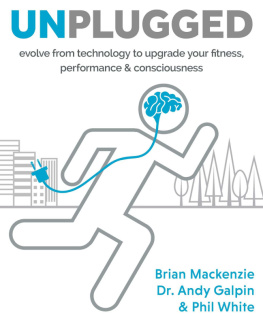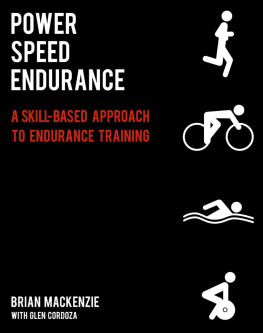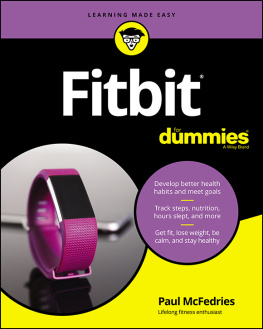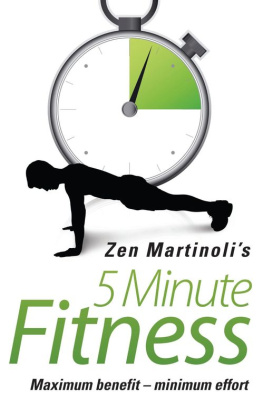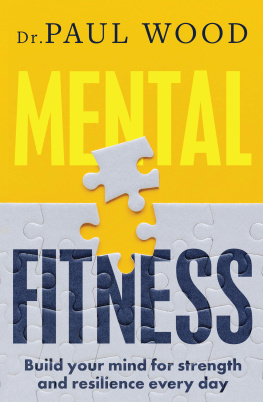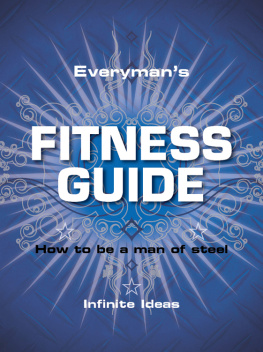First Published in 2017 by Victory Belt Publishing Inc.
Copyright 2017 Brian Mackenzie, Dr. Andy Galpin & Phil White All rights reserved
No part of this publication may be reproduced or distributed in any form or by any means, electronic or mechanical, or stored in a database or retrieval system, without prior written permission from the publisher.
ISBN 13: 978-1-628602-61-6
The information included in this book is for educational purposes only. It is not intended or implied to be a substitute for professional medical advice. The reader should always consult his or her health-care provider to determine the appropriateness of the information for his or her own situation or if he or she has any questions regarding a medical condition or treatment plan. Reading the information in this book does not create a physician-patient relationship.
Victory Belt is a registered trademark of Victory Belt Publishing Inc.
Book design by Justin-Aaron Velasco
Illustrations by Justin-Aaron Velasco
Printed in CANADA
TC 0117
d_r0
CONTENTS
CHAPTER 1
THE WEARABLES REVOLUTION: MAKING SENSE OF MEASURABLES
CHAPTER 2
REBOOTING YOUR TECH-ADDICTED PSYCHE
CHAPTER 3
CIRCUIT-BREAKING THE STRESS CYCLE
CHAPTER 4
ROUTING OUR WAY BACK TO NATURE
CHAPTER 5
USING SENSES, NOT SENSORS
CHAPTER 6
SEARCHING FOR HEALTH IN FITNESS
CHAPTER 7
COACHING 2.0: TECH AS A TOOL, NOT A TASKMASTER
CHAPTER 8
BETA TESTING THE SELF-DRIVING ATHLETE
CHAPTER 9
PULL THE PLUG
The Matrix is a system, Neo. That system is our enemy. But when youre inside, you look around, what do you see? Businessmen, teachers, lawyers, carpenters. The very minds of the people we are trying to save. But until we do, these people are still a part of that system and that makes them our enemy. You have to understand, most of these people are not ready to be unplugged. And many of them are so inured, so hopelessly dependent on the system, that they will fight to protect it.
Morpheus, The Matrix

INTRO DUCTION
Jerry Seinfeld once did a skit in which he imagined aliens looking down from space, seeing us scooping up our dogs poop, and assuming that it was our pets who were the real masters. Ten years on, what would extraterrestrials deduce if they observed us running around following the commands of little devices on our wrists and checking these tiny screens obsessively every few minutes? Theyd likely conclude that some all-powerful overlord was telling us what to do at all times through these strange gadgets. This isnt the stuff of science fiction or a stand-up comedy routine but a daily reality for the millions of people whove made fitness wearables and apps a multibillion-dollar industry.
In early human societies, physical prowess was a survival tool. Our ancestors needed to be able to fend off and outrun predators and hunt and kill their own prey to stay alive and feed themselves and their families. As we progressed and started living in more-sophisticated tribes, the need for speed, strength, power, and endurance remained practical, as people had to be able to fight and ultimately defeat rival groups. Many ancient cultures also had physically demanding rites of passage that people had to undertake to confirm their transition into adulthood.
Such instincts were also directed toward athletic competitions that determined who could lift and throw the most weight and run the fastest. While the ancient Greeks and Romans maintained formidable armies for fighting off their enemies, they also staged sporting contests for the sake of ego and amusement: the ancient Olympic Games, gladiator contests, and so on. The Middle Ages saw knights jousting and strongman cultures developing in countries like Scotland (whose stone-lifting-and-throwing traditions would evolve into the modern Highland Games) and the Basque region of Spain.
Fast-forward a few hundred years to the late 1800s and reductions in working hours birthed a relatively new concept: leisure. With industrialization, people began to have more money to do things outside of the workplace and more time to participate in and watch sports. Soccer, baseball, football, rugby, and the modern Olympics resulted.
But even the most visionary Victorians could never have imagined the extent to which recreation would grow from spending a nice afternoon kicking a ball around a field or paying to watch their favorite team do so into a multibillion-dollar global sports and fitness industry. They certainly couldnt have anticipated that active leisure would eventually move indoors, that the penny-farthing bicycles that one pedaled precariously around the village square would be replaced by rows of stationary bicycles that display virtual maps, heart rate, and power output. That the humble pocket watch used to time men and horses as they ran around tracks would evolve into powerful, smart devices capable of capturing gigabytes of biometric data. Or that wed somehow go from drinking a pint of Good for You Guinness with friends in a pub after a long walk in the countryside to ingesting a daily cocktail of chemicals designed to yield maximum results from a strictly regimented training program.

Leisure was initially available only to the rich, as their diminished need for physical work (working in the fields, building houses, and so on) afforded them the extra time to expend physical energy in sport. What they didnt see coming was the next major change in society, heralded by the advent of the personal computer. In fact, they certainly couldnt have predicted the speed at which our society would reach nearly complete automation, meaning that the physicality of most jobs has been all but eliminated. Although were not quite there, Moores lawwhich notes that the number of transistors per inch on a circuit doubles every year, with corresponding increases in computing powersuggests were shockingly closer to that reality than most accept.
Thus, were at the dawn of a new age in which physical exertion is almost completely removed from our daily lives, a gap that we try to fill with technology-dictated exercise. The major difference between the late-Victorian-era shift away from physical activity and the current one is speed. The need for nonwork physical activity during the Industrial Revolution took decades to fully manifest itself, giving individuals and society as a whole time to adjust so that no major decreases in human health occurred. However, the New Industrial Revolution is happening in the blink of a species eye.
We need to adjust. Now.
The push for everyone to take ten thousand steps a day was an early fix, and while this may return us to a base level of physical activity (in other words, simulating the movement that used to be part of everyones working day) to help stop us from dying from preventable, chronic lifestyle diseases, it wont suffice to fully eliminate the burden of a sedentary life. Technology companies got wind of our cultures sedentary lifestylerelated issues and are pouring billions of dollars into fitness trackers to help return us to a minimal level of physical activity. Some even aim to improve the peak performance of the elite.

